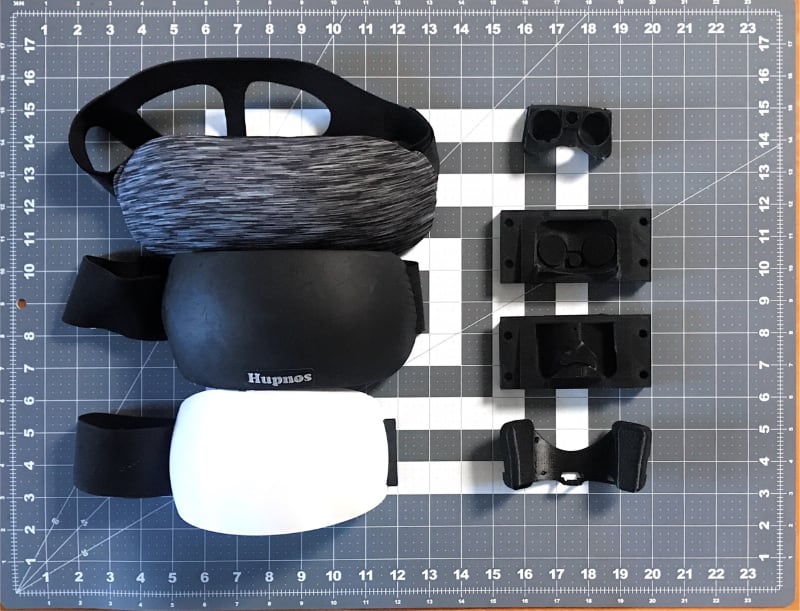Did you know that there are bedframes designed to rock you to sleep? Or mattresses that change their temperature? How about a snore-preventing sleep mask full of accelerometers?
These products are just the beginning of an emerging market known as "Sleep Tech."
In this episode of Here's an Idea, we wanted to get an idea of the products out there – and to find out which ones are helpful and which ones are hype.
As we explored the new ideas in Sleep Tech, we spoke with engineers and researchers who’ve spent years working on their own inventions.
We discussed their design process, and how challenging it is to tailor one product for a whole world of people who are having trouble getting to bed.
And we asked two noted sleep specialists: When it comes to a better night’s sleep, what role should technology play – if any at all?
Listen to the episode below.
Episode Highlights:
- It took two and a half years, 60 prototypes, and even some of his children’s craft foam, but former designer and sensor pro Curtis Ray finally made his snore-stopping Hupnos Sleep Mask. "Get things done in very small steps rather than working on the grand plan that might take you six months before you get to test anything," Ray told our readers.
- We can close a curtain or use a white-noise machine, but entrepreneur Todd Youngblood thinks one element – beyond light and sound – has been somewhat ignored: Temperature. We talk to Todd about his Ooler Sleep System and his interesting family connection to the waterbed.
- A company called DREEM wants to bring the in-depth analysis of a sleep clinic to your bedside. The company's headset monitors one factor that your phone can't detect just yet: brain activity.
- What role should technology play in getting a good night's sleep? We talk with two professionals: The "Sleep Doctor" Michael Breus and Stanford sleep specialist Rafael Pelayo. See excerpts from our conversations below:

Dr. Breus, on the limitations of tracking technologies:
"Many of the companies that track sleep are tracking companies. They're not sleep companies. When you're a tracking company, it's fairly easy. Knowing what a person's stride is, knowing how many calories they eat, how many steps they take, that's really kind of a mathematical calculation."
"If you wake up in the morning, and I say, 'How did you sleep?', you're not going to say 'I slept 347 steps, right?'"
Dr. Breus, on the new Sleep Tech products on the market:
"If people out there are looking at tech and wanting to improve their sleep, they need to make sure that the recommendations that are given based on the data collected are actually recommendations that have been created or approved by a board of certified sleep specialists."
"There is an entire board certification process going on. There are thousands of us out there that do this, and virtually none of these technologies go to anybody who's bothering to create these pieces of advice based on real sleep science. So you have to be careful with that advice that you get, because depending upon where you get it, if it's non-qualified advice, it could actually turn out to be dangerous."
Dr. Pelayo, on the challenge of bringing tracking apps into the treatment process:
"Patients commonly will come in showing me their app, but there's so many different apps and gadgets. I'm not really sure what I'm looking at. I think the value of the wearable is over time within that individual."
"I like the idea of wearables in the sense that it forces the person to become aware of their sleep more. Just like keeping track of your calories can make you aware of your nutrition, keeping track of your steps makes you think of your exercise activity. Simply tracking your sleep makes you aware of it."
Dr. Pelayo, on the importance of Sleep Tech:
“I think technology is cool. I look forward to what’s going to be coming up next. What we don’t want is garbage science. We don’t want junk being sold to people”
“People with sleep problems tend to think that tomorrow depends on how well they sleep tonight. If you go to bed thinking tomorrow depends on how well I sleep tonight, then you’ve got to go to bed monitoring your sleep, to predict tomorrow, and the act of monitoring your sleep is going to make you sleep lighter, and make you sleep less refreshing to you. And you’d get quite in a vicious cycle."
Dr. Breus, on how much we need (or don't need) Sleep Tech:
"You don’t have to have a device that makes you sleep. You don’t have to have something that tracks it to make you sleep. In fact, there’s some data to suggest that some people will buy a tracker and become so obsessed with it, it’ll actually disrupt their sleep.
"I tell people all the time, sleep is a lot like love. The less you look for it, the more it shows up.”
Get the Here's an Idea newsletter sent direct to your inbox each month.

